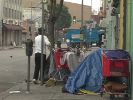Eye For Film >> Movies >> Lost Angels (2010) Film Review
British director Thomas Q Napper focuses on Los Angeles Skid Row in this documentary which aims to explore what leads people there in the first place and to dispel some of the myths about it. The very name Skid Row suggests the end of the line, the place beyond which there is nowhere further to fall - unless it is into a 6ft hole in the ground. As one of the people who has lived there says, "it's the last house on the block".
The film sprang from, perhaps surprisingly, the Robert Downey Jr/Jamie Foxx drama The Soloist. Napper - who worked as second unit director on the film - and director Joe Wright, were determined to use the genuine residents of the area as extras in the film. Whether you feel the resulting feature has a little too much gloss or not, there is no denying they were touched by the people they met during the shoot - as evidenced by this film which invites them to talk about their lives.

Napper quickly sets his stall out, explaining - via narration from Catherine Keener - that two-thirds of those who are homeless suffer from mental illness, drug addiction or, frequently, a combination of the two. Even the term "homeless" comes under scrutiny. Many of the people who live in this 50 block radius that butts up against some of the most affluent districts of LA are living nor on the street but in single-occupancy, low-rent homes - always in short supply and now, thanks to the creep of gentrification, an endangered species.
Lost Angels has a rather slow-build but once it gathers momentum, it raises issues concerning the need for places like it - it is much cheaper to house people in areas like this than to arrest them and put them in jail, for example. It also explores the abuse of civil liberties that the residents live with every day. While there is an attempt to show one cop reaching out to help this community, there is also evidence of wide-spread abuse thanks to the adoption by the police of the controversial "broken windows theory". This system - first employed in New York - works on the supposition that if you crack down on minor crime it will mean a reduction in major crime. But, given that the majority of the crime in Skid Row is of a minor nature, the only thing which seems to be achieved is harrassment of the populace and a considerable amount of ineffective/unneccesary arrests.
Not breaking much in the way of new ground in terms of what most people already realise about homelessness/quasi-homelessness, Napper's film also suffers a little from a lack of background information. People are, for example, frequently introduced by the acronym of their organisation, which then goes unexplained.
But the film's strengths lie not in its presentation but in the stories it contains. Napper lets those who live and have lived on the row tell their own tales. It's not the most dynamic of retellings, for sure - relying mostly on talking heads and shots of the neighbourhood - but the humanity and emotion of those he speaks to is not in doubt. He paints a picture of a place that which may well be the last destination anyone wants to reach but which also, paradoxically, offers a substantial amount of hope for those who find themselves there. There are shelters and outreach workers and, it seems, a gratifying number of people who have picked themselves up and dusted themselves off who now dedicate much of their lives to helping others do likewise. The resulting testimony is compelling, eye-opening, hopeful and surprisingly universal.
Reviewed on: 02 Mar 2011

















